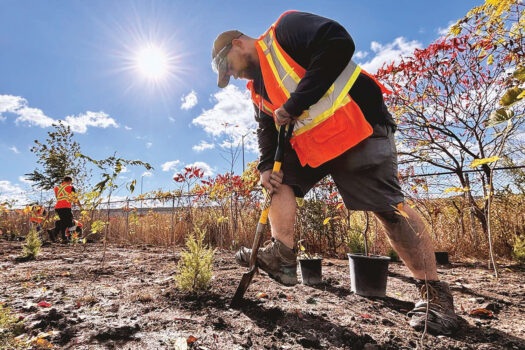By Sally Harvey CLT, CLP
Education and Labour Development Department
 How often has the government given you a gift? I am guessing not often. But they are now through the introduction of the Red Seal Landscape Horticulture Apprenticeship designation.
How often has the government given you a gift? I am guessing not often. But they are now through the introduction of the Red Seal Landscape Horticulture Apprenticeship designation.
What is the Interprovincial Standards Red Seal Program? The Government of Canada recognizes that the skilled trades are essential to building and maintaining Canada’s place in the economy. It has a clear role in supporting the skilled trades and in encouraging more Canadians to pursue apprenticeship, in order to meet the growing need for skilled trades people. With that, the Canadian Council of Directors for Apprenticeship approved our industry as a Red Seal trade last October.
Red Seal allows qualified trades people to practise their respective trade in any province or territory without having to write additional examinations, thus improving labour mobility in Canada. Through the program, apprentices, who have completed their training and certified journeyperson’s certification, are able to obtain a Red Seal endorsement on their Certificate of Qualification and Apprenticeship by successfully completing an Interprovincial Standards Examination offered by each provincial training office.
There are also now several grant opportunities available to both employers and apprentices, once you are accepted in to the program and fulfill all obligations. What does it mean to us as employers? The benefits are many. The human resource element is so very important in our business plans, as it is our people asset that carries out our company vision. With that in mind, we know through studies done by the Canadian Apprenticeship Forum (CAF), that hiring apprentices is important to replace the aging workforce and to reduce the turnover rate. Employers indicated that a homegrown journeyperson (i.e., trained as an apprentice within the organization) is more productive. On average, employers indicated that homegrown journeypersons are 26.5 per cent more productive than non-apprentice-trained staff, which is an additional benefit of apprenticeship training.
A staff turnover rate translates into unnecessary potential loss. We know that it takes over one year to gain full potential from a new hire, not to mention the loss of efficiency of the trainer by 14 per cent during that training time period. It’s easy to see that investing in apprenticeship is an easy decision.
One additional advantage is the Apprenticeship Job Creation Tax Credit, a non-refundable tax credit equal to 10 per cent of the salaries and wages payable to eligible apprentices. The maximum credit is $2,000 in total for each eligible apprentice. For detailed information on the Apprenticeship Job Creation Tax Credit for employers, go to: www.cra-arc.gc.ca/whtsnw/pprntcshp-eng.html. This is an amazing retention strategy for the “keepers,” particularly in these economic times. Train them on the job, send them to school during the slow season and have them back more skilled, more knowledgeable and therefore a greater benefit to your bottom line.
What is in it for the apprentice?
The apprenticeship program has been carefully designed to teach the skills young workers need to know in order to be a success in the landscape horticulture industry. Apprenticeship training is another valid way to receive the required skill and knowledge that one needs for a life-long successful career. Many people learn better by doing on the job, as opposed to classroom training. While there are knowledge-based information and skills required in the horticultural technician apprenticeship program, training focuses on 90 per cent doing and practicing together with 10 per cent classroom training.
Most people who receive training in the skilled trades are making an excellent living and enjoying a successful and rewarding career. Apprenticeship training is another recognized way of continuing education after graduation from high school, or as a pathway to success as a second career.
The landscape horticulture industry needs trained employees who can produce quality landscape/nursery projects and who know how to make it happen. An industry working committee of employers and employees, who know the industry’s requirements, prepares up-to-date training standards. Employees develop these skills on-the-job over a period of time that suits them. Because of this specific skill development, apprenticeship graduates are in high demand.
As an added benefit, through the employment insurance system (www.servicecanada.gc.ca/eng/subjects/employment), the Government of Canada provides income support to eligible apprentices during their periods of in-school technical training.
Many Canadians, who wish to pursue a career in the skilled trades, face financial barriers. This grant is available to registered apprentices who have completed their first or second year level, or equivalent, in an apprenticeship program in one of the Red Seal trades, on or after January 1, 2007.
There is also a program that provides employed tradespersons with an annual deduction of up to $500 to cover the cost of new tools necessary to their trade. For detailed information, refer to the previous noted Apprenticeship Job Creation Tax Credit website.
I encourage employers to evaluate all of your permanent and seasonal staff by the end of June, once you have determined those who are what we call “best fit employees,” or keepers. Please engage them by offering them apprenticeship training. I have been told by the MTCU that we are entitled to register apprentices any time of the year through regional training consultants. The advantage is that you engage them right away, and they start right immediately on training and beyond the corresponding skills and signing of their practical standard, as they prove competency in each area. They know right away that they have a future with your company. This also gives them a bit of a head start, and a lot more confidence. This requires you to contact your regional MTCU office, talk to the training consultant assigned to our industry: www.horttrades.com/apprenticeship
Employees should be asking their employers for this opportunity. The benefits are great. There is no question that apprenticeship is a win/win opportunity that has only become better with the Red Seal designation attached to it. I urge you to take advantage of this fantastic gift!
Sally Harvey may be reached by email at sharvey@landscapeontario.com








